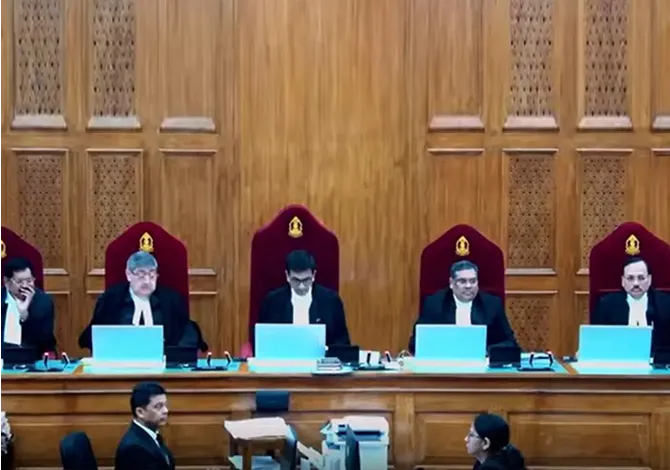A process that started in August 2019 finally culminated this week when the Supreme Court placed its seal of approval on the Narendra Modi government's decision to revoke Article 370 of the Constitution. On 5 August 2019, Home Minister Amit Shah announced in parliament the scrapping of Article 370, which had exempted Jammu and Kashmir from the Indian Constitution (except Article 1 and Article 370 itself) and permitted the state to draft its own Constitution. The state was bifurcated into two Union Territories - Ladakh without a legislature, and Jammu and Kashmir with a legislature. It was a transformative move and predictably generated strong passions across the political spectrum, leading to challenges in court. Since August, the constitution bench of the Supreme Court had taken up nearly 23 petitions challenging the government's decision.
Underlining that the abrogation of Article 370 was a "culmination of the process of integration" of Jammu and Kashmir with the Union, the Supreme Court this week declared that there was no malafide intention in declaring this article inoperative. The Constitution bench upheld the power of the President of India to unilaterally dilute special status accorded to the former state of Jammu and Kashmir per Article 370. The highest court of the land made it clear that Jammu and Kashmir "surrendered" its sovereignty "full and final" when a proclamation was issued for the state on 25 November 1949, and that Article 370 was a temporary provision - an interim arrangement due to war conditions in the state.
Partisan politics on this matter will continue despite the verdict but the Supreme Court has drawn a line under the issue. In more than ways than one, it strengthens the position of Prime Minister Narendra Modi on the global stage as a leader who is serious about finding decisive solutions to India's domestic problems.
The status quo on Kashmir had become unsustainable long back. It was only the political and policy inertia that was keeping Indian policymakers from challenging that. The so-called problem in Jammu and Kashmir has always been a bilateral matter between the people of the state and the rest of the country. The rest of India has been living with one set of policies vis-a-vis Jammu and Kashmir for the last seven decades and the results have been underwhelming. Just as the people of Jammu and Kashmir have a stake in the rest of India, the rest of India too has a stake in the state. The Modi government had underlined that it is not only serious about consolidating India's frayed peripheries but is also cognizant of the aspirations of a state, which, despite its resources, has become a cesspool of violence and degenerative politics.
The success of the government's reform agenda is critically important for the people of Jammu and Kashmir and for India's own future. And its full operationalisation will take time but the results are already visible in declining violence, rapid pace of infrastructure development, and growing tourist numbers.
While critics in India continue to crib about government measures, their seriousness of intent is well-appreciated by India's adversaries. After all, one of the reasons China upped the ante in Ladakh was in recognition of the fact that these measures can fundamentally alter India's strategic periphery to China's long-term detriment. India is finally making its intent clear and that is bound to unnerve those who were comfortable with the status quo.
The meltdown in Pakistan after the Supreme Court verdict makes it clear how irrelevant Pakistan has become to the discourse on Kashmir. For all its tantrums, it had long lost its locus standi on the matter. Now all the posturing of Pakistani politicians is for the domestic audience. Though it made a big deal of cutting off trade ties with India and recalling its high commissioner after India's decision to revoke Article 370, the world moved on and there has been no impact of these decisions except to make Islamabad even more redundant in the Indian foreign policy matrix.
After Supreme Court's verdict, there is a chance of a new start, if Pakistan recognizes the new realities on the ground, but that too will have to wait till the election. Whatever happens now, it is clear that the terms of engagement will be set by New Delhi.
For the rest of the world, which was already engaging with India as a rising economic and geopolitical player, the Supreme Court verdict will further reinforce the sense that Prime Minister Modi is in sync with the wider mood in the country and that the Kashmir issue is no longer the key lens through which to view either India or the government. By burying Article 370, the government has buried one of most serious challenges that Indian foreign policy faced on the global stage for the more than seven decades. The Supreme Court's validation of the move couldn't have come at a better time for Modi.
This commentary originally appeared in NDTV.
The views expressed above belong to the author(s). ORF research and analyses now available on Telegram! Click here to access our curated content — blogs, longforms and interviews.




 PREV
PREV


